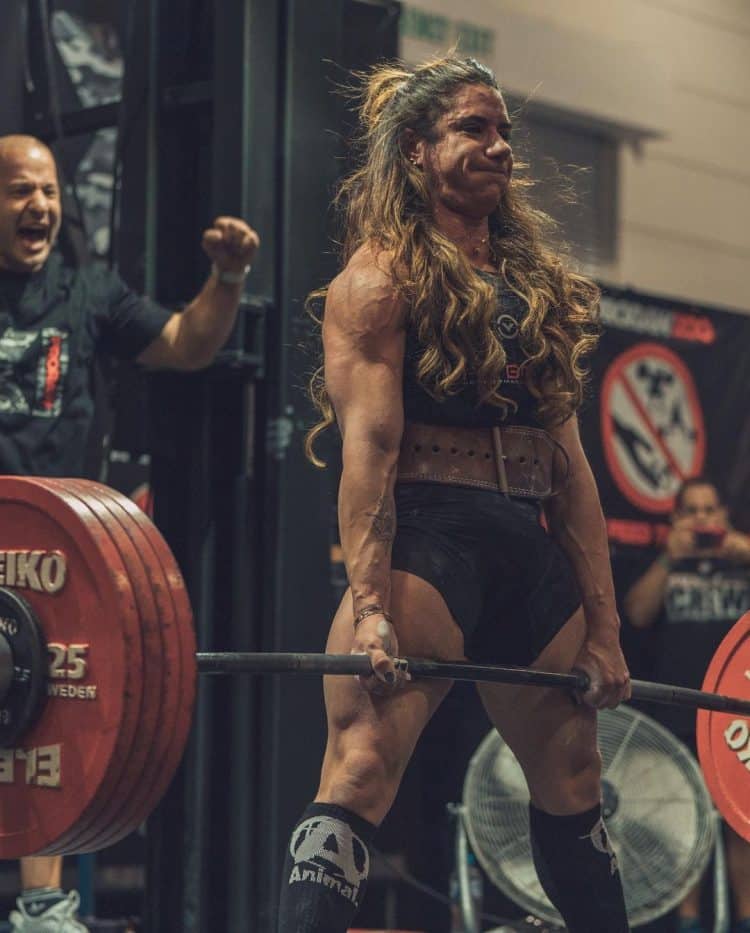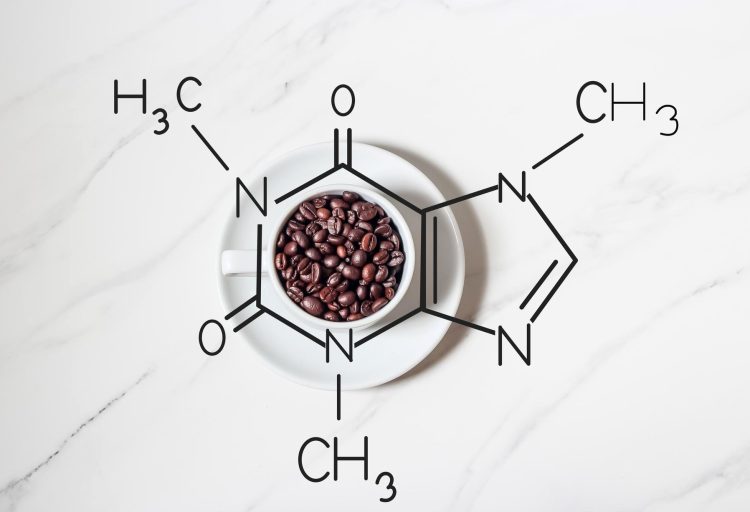How much caffeine is too much for athletes? The ideal intake depends on body size, tolerance, and activity type. Generally, 1.4-2.7 milligrams per pound (3-6 milligrams per kilogram) of body weight is considered safe for adults, and 1.13 milligrams per pound (2.5 milligrams per kilogram) is considered safe for children and adolescents.
Furthermore, the FDA has cited 400mg of caffeine a day as the daily maximum for adults. This comes around to be four or five cups of coffee. However, this can vary depending on an individual’s sensitivity to caffeine. (1)(2)
Serious athletes who consume caffeine daily usually tread close to the 400mg limit. This is considering the fact that a single serving of most pre-workout supplements contains between 150 and 200 milligrams of caffeine.
An athlete who weighs 150 pounds (68 kilograms) can consume 200-400 milligrams of caffeine according to the maximum daily allowance. People over 150 pounds can increase the lower limit but should stay under the 400mg max cap.
One 8 fl oz (240 ml) cup of coffee contains 95mg of caffeine.
Caffeine — The Magic Drug
Picture this: You’re pumped to crush your workout but lose the drive as soon as you begin your second set. Most of us have experienced this, and the sad part is we cannot stop it from happening again.
Energy, alertness, endurance, and focus are vital for a kickass training session.
The good news is that humankind has discovered a stimulant that can get us all four on demand. Caffeine is the darling of the fitness industry. Many athletes drink a cup of coffee before a training session to get their blood pumping, while others prefer downing a scoop of a pre-workout supplement to boost their performance.
However, there is a fine line between consuming caffeine for a performance boost and entering the ‘too much’ category.
Understanding how caffeine works and its pros and cons can help you determine your optimal caffeine dosage. It will also help minimize the side effects and chances of building a tolerance.
How Much Caffeine Is Too Much For Athletes?
Caffeine has become a pre-workout staple for most athletes. Several studies show that caffeine can boost performance, endurance, and coordination. (3)
This begs the question, where do we draw the line?
As mentioned above, according to the FDA, consuming 1.4-2.7 milligrams per pound (3-6 milligrams per kilogram) of body weight is considered safe for adults. Try our caffeine calculator – to find if you are consuming too much?
However, several major sports governing bodies have their own caffeine rules.
Caffeine Guidelines for Different Sports Organizations
- International Olympic Committee (IOC): The IOC has set a limit of 12 micrograms of caffeine per milliliter of urine, after which it is considered a banned substance.
- National Collegiate Athletic Association (NCAA): The NCAA has slightly stricter rules. They limit caffeine to 15 micrograms per milliliter of urine.
Pro Tip: Always check the rules and guidelines of your respective organization before entering a competition.
Factors Influencing Caffeine Tolerance
No two people react to caffeine the same way. For instance, I have a high caffeine tolerance and usually take around 150-200 milligrams of the stimulant before a workout. However, some of my training partners start shaking like a leaf when they reach this number.
Here are the factors that affect caffeine tolerance:
Body Size
Caffeine dosage is usually calculated based on body weight. Bigger individuals typically have a higher caffeine tolerance compared to smaller people. Beginners should start with the smallest dose to check how their body responds.
Regular Caffeine Intake
People who drink coffee multiple times a day, usually end up developing a tolerance. These folks must then increase their caffeine dose significantly to get the same kick as before.
Genetics
Like everything else in health and fitness, genetics plays a crucial role in how your body responds to caffeine. Some people are naturally more sensitive to caffeine, whereas others can handle a much bigger dose.
I am not flexing here, but I’m one of the lucky few who can sleep after a late-night coffee. This could be a blessing or curse, depending on who you ask.
How Caffeine Works
If you are feeling drained during the day and want a quick energy fix, a dose of caffeine usually does the trick.
However, have you ever wondered how caffeine works? Let’s break it down:
Nervous System Boost
When you drink coffee, it heads right for your nervous system. Its main objective is to block a chemical called adenosine, which tells the brain that you’re tired and exhausted and should rest.
Caffeine’s primary effect is to block adenosine receptors. It makes you feel more alert and less likely to yawn like a hippo in the gym.
Feel-Good Kick
The effects of caffeine don’t end at adenosine.
Caffeine also slightly spikes adrenaline production, which is the hormone responsible for making you feel focused and pumped. Furthermore, it slows down dopamine reabsorption, which produces the feel-good effects of caffeine.
The Bad Side
Too much of anything is a bad thing.
Overdosing on caffeine can cause jitters, anxiety, and poor sleep. Plus, you might have to deal with the infamous caffeine crash if you go overboard with the stimulant. This dreaded crash has given rise to a whole new category of coffee — decaf.
Decaf coffee typically has 2-15 milligrams of caffeine in an 8-ounce cup.
Remember, the effects of caffeine can vary for each individual depending on their tolerance and sensitivity.
Pros and Cons of Caffeine for Athletes

Love it or hate it, caffeine (and coffee) is here to stay. In fact, most athletes cannot imagine their day without a steaming mug of coffee.
That said, here are the advantages and disadvantages of caffeine for athletes:
Pros of Caffeine For Athletes
- Improved Endurance: Caffeine’s effects on dopamine and adrenaline allow you to push a little harder and for longer in your workouts. Most of my clients notice a big difference in their training performance with and without caffeine.
- Delayed Fatigue: By blocking adenosine, caffeine masks the fatigue signals. Caffeine can help you get a few extra sets and reps in a workout.
- Increased Focus: Caffeine can help improve your focus. Many pre-workout supplements include additional nootropics, which can give you a laser-sharp focus.
Cons of Caffeine For Athletes
- Jitters: Going overboard on caffeine, as I’ve experienced several times, can leave you with shaky hands and a racing heart. It’s not the best thing if you have been eyeing a PR.
- Anxiety: Caffeine is not suitable for athletes who deal with anxiety issues, as it can multiply its effects. Skip the caffeine if you’re especially nervous before a competition.
- Insomnia: Consuming caffeine too close to bedtime can lead to insomnia. I recommend avoiding caffeine after 4 p.m.
- Addiction: Let’s be honest; caffeine is addicting. Consume it for a long enough time, and you’ll almost become dependent on it. The worst part? Many even experience withdrawal symptoms like headaches and laziness when cutting back on their caffeine intake.
- Building Tolerance: A scoop of a new pre-workout supplement might fire you up for your workout. However, it will probably lose its charm after a month. You will then need a bigger dose to get the same effect. This is a vicious cycle.
Side Effects of Caffeine on Athletic Performance
Caffeine can be a godsend for people who lack the energy or focus to hit the gym. However, overdosing on caffeine can backfire, too.
Here is how excessive caffeine can hamper your athletic performance:
- Dehydration: Caffeine is a diuretic. It can increase the frequency of your bathroom trips. Dehydration during a competition can lead to muscle cramps and loss of endurance, both of which can hamper your performance.
- Poor Sleep: Drinking too much caffeine or working out too close to bedtime can lead to trouble falling asleep. Sleep is crucial for muscle recovery. A disturbed sleep pattern can increase your risk of injury.
- Increased Heart Rate and Anxiety: There is a thin line between an optimal caffeine dose and an overdose. An excessive amount of caffeine can lead to a racing heart, anxiety, and difficulty maintaining focus.
Learn To Listen To Your Body
Every individual reacts to caffeine uniquely. Here are the telltale signs that you’re consuming too much caffeine:
- Shakiness and Jitters: Are your hands shaking, and do you have trouble maintaining good form during exercise? This could be a sign of a caffeine overdose.
- Racing Heart: A little nervousness before an intense training session is fine, but if your heart is pounding through your chest on a light training day, you have a problem at your hands.
- Headaches: This caffeine side effect is often overlooked. A high dose of caffeine can hit you in the head like a baseball bat. Furthermore, if you experience a headache on days when you don’t consume caffeine, it is a sign that you should lower your daily intake.
- Diarrhea: Loading up on caffeine can cause stomach issues, and keeping your food down during a training session might become a challenge.
- Anxiety: Are you constantly stressed and worried? You should assess your caffeine intake.
Finding Your Caffeine Sweet Spot For Optimal Athletic Performance
Here is how to find the ideal caffeine intake for your athletic performance:
Start with Low Doses
Beginners should start with the smallest dosage. If a pre-workout supplement’s recommended dosage is one scoop, begin with half of that.
As a rule of thumb, newbie coffee drinkers should stay within the 500-100 milligrams of caffeine a day bracket. As you build tolerance, gradually increase the dosage as needed.
Strategic Timing
Why are you consuming caffeine? Are you a regular coffee drinker, or are you taking it for its performance benefits? If it is the latter, you should consume caffeine 30-60 minutes before a training session.
Caffeine Cycling
You’ve probably heard of creatine cycling; you can apply the same principles to caffeine to avoid building a tolerance. If you don’t feel an energy boost even after a couple of espresso shots, you should cut caffeine out completely for a week or two. This will help reset your system and lower your caffeine tolerance.
Stay Hydrated
Whether you are consuming caffeine or not, you must drink at least a gallon of water daily to avoid the risk of dehydration. Since caffeine is a diuretic, drinking water at regular intervals throughout the day can help counterbalance its impact on your body.
As you tweak your caffeine intake, you must constantly evaluate how your body responds. If you experience any of the side effects mentioned above, like anxiety, poor sleep, or dehydration, you should reduce your dose.
Beyond Caffeine: Alternatives for Athletes
Although caffeine is an energy powerhouse, there might be times when you should take a break from it. Here are a few caffeine alternatives for athletes to power their workouts:
Natural Power Boosters
You cannot overlook these:
- Hydration: Aim for four gallons of water daily. I recommend my clients drink water every half an hour to avoid the risk of dehydration. Feel free to add electrolyte supplements to the plain water for a mineral boost.
- Nutrition: A nutrient-rich whole-food diet can help avoid energy crashes and deliver long-lasting energy.
- Sleep: Get at least seven to eight hours of sleep each night to streamline your recovery (and energy levels).
Supplements
Need an extra kick but without the caffeine crashes or spending a fortune on pre-workout supplements? Here are the pre-workout ingredients you must look out for:
- Beta-alanine: It can boost your endurance and help you perform more sets and reps. It is the ingredient responsible for the tingly feeling in a pre-workout supp.
- Citrulline can improve blood flow and enhance nutrient delivery to the target muscles, potentially helping lower workout fatigue.
Next Read: 20 Best Pre-Workout Supplements Review & Ranked by Experts
Conclusion
Is caffeine right for you? Well, that is a decision that you must make for yourself. Weigh the pros against the cons and factor in your sensitivity and tolerance, your sport, and caffeine’s overall impact on your health.
Although 3-6 milligrams of caffeine per kilogram of body weight is the recommended dose for performance boosts for athletes, there is no magic number that works for everyone. Try switching up your intake and settle on what works best for you.
If you have any questions about how much caffeine is too much for athletes, drop them in the comments below, and I’ll be happy to help!
References
Fitness Volt is committed to providing our readers with science-based information. We use only credible and peer-reviewed sources to support the information we share in our articles.
- U.S. Food and Drug Administration. Spilling the Beans: How Much Caffeine is Too Much? [Online]. Available at: https://www.fda.gov/consumers/consumer-updates/spilling-beans-how-much-caffeine-too-much#:~:text=For%20healthy%20adults%2C%20the%20FDA,it%20(break%20it%20down. Published March 22, 2024. (Accessed: March 23, 2024)
- Verster, J. C., & Koenig, J. (2018). Caffeine intake and its sources: A review of national representative studies. Critical reviews in food science and nutrition, 58(8), 1250–1259. https://doi.org/10.1080/10408398.2016.1247252
- Paluska S. A. (2003). Caffeine and exercise. Current sports medicine reports, 2(4), 213–219. https://doi.org/10.1249/00149619-200308000-00008
Tip: If you're signed in to Google, tap Follow.












